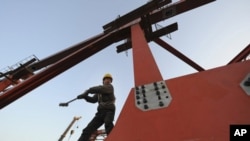China's crackdown on corruption has cast a shadow over the powerful Railways Ministry. Former Railways Minister Liu Zhijun has been fired and there are accusations that more than $100 billion is missing.
The widening probe into graft has raised calls for the government to reconsider its investment in high-speed railways.
China boasts some of the fastest trains in the world and has embarked on an ambitious project to link many cities by high-speed trains.
Modernization
The $274 billion plan is part of an infrastructure policy costing hundreds of billions of dollars. The government aims to build at least 30,000 kilometers of track over the next few years: nearly half of it for high-speed trains.
But the new railways minister, Sheng Guangzu, has had to defend the plan from a barrage of criticism.
Much of it begins with the recent firing of Liu Zhijun, who was the railways minister for eight years. There are accusations that under his administration $121 million was embezzled.
Other railway officials have been fired and detained for corruption.
At least one proposal to slash the high-speed rail project is to be presented to a top advisory group during the annual session of the National People’s Congress this week.
But the new railways minister says Liu's firing will not affect the plan.
The World Bank's railways expert Richard Bullock, who works with the government on development projects, says Liu's dismissal is unlikely to derail the modernization plans.
But he says Liu’s successor has made significant changes.
"The new minister has put some emphasis on two areas," says Bullock. "They are safety and procurement mechanisms. These are indications in changes of management style."
If the expansion plan is completed, China will have the second-largest rail infrastructure in the world after the United States. But the railways scandal follows questions about the economics of the high-speed project, much of it funded by loans.
Railway expansion criticized
Some critics say the network seems extravagant given China’s vast size and relatively low per capita income. They say to pay back the loans tickets will have to be priced so high they will be out of the reach of most Chinese.
Even the national research institution, the Academy of Science, reported last year that at current investment and estimated passenger numbers, the trains will never collect enough in fares to repay construction loans.
The vast amount of money tied to railway projects, and real estate deals linked to them, has provided ample opportunity for graft.
That has led to fears over the long-term safety of the tracks and other parts of the network.
Endemic graft
Corruption is a significant problem in China, and the communist government has tried to crack down on it. Liu's dismissal is seen as significant as top Communist Party officials are rarely fired for corruption.
Wang Yukai, an anti-corruption expert at the Chinese Academy of Governance, says Liu's firing shows the government is no longer turning a blind level to corruption in high office.
And he says it's important to give the media, Internet, and the public the power to decipher and understand what goes on in government ministries such as the railways. That, he says, is an important way to solve the problem of corruption, which, Wang points out, is very deep in China.
Past campaigns to weed out corrupt officials have largely been seen to have failed. Premier Wen Jiabao said in his opening speech at the National People’s Congress on Saturday that ridding the country of corruption is a priority, because graft helps foster discontent.
But Liu's firing could act like a double-edged sword. On one side, it indicates that leaders are showing no favor in the latest clean-up campaign. Yet, on the other, it may reinforce to the public the idea that corruption is rife at all official levels.
26-year-old rail passenger Meng Qingyi, who works for a steel company, says it's a good thing the government has fired some one as high-profile as Liu.
But he hopes the corruption scandal will not derail the high-speed plan because fast trains are important to Chinese like him.
